Click on the "Book Now" links found throughout the website.
This depends on your goals. If you want to climb a particular climb, choose that climb. If you want to improve a certain skill set (e.g. lead climbing confidently), then choose the course in question. You can then also request a favorite location for the training. Remember, our courses and guiding is all private, so you can cover whatever technical material you want to learn on any climb that you want as long is it supportive of your learning goals.
Of course. Just type that into your checkout. We will let you know if they are available.
Climbing rock efficiently requires a high level of proficiency with numerous technical systems, a strong suite of physical skills, and a host of decision-making capabilities. Climbing with a competent guide can help you jump quickly to the next level of technical knowledge, physical technique, and risk management. Below are some specific reasons that climbers with different experience levels can benefit from guided instruction and/or guided climbing
Many beginner climbers hire guides to teach them the rudiments of climbing and get them started correctly with solid climbing technique as well as proven technical systems and skills. This is an excellent way to learn accepted modern techniques of climbing and to begin to competently manage the risks of some components of your personal climbing. Additionally, climbing with a guide can help you quickly gain enough knowledge to evaluate the climbing systems of other more experienced climbers that you depend on for your safety as you start climbing.
Intermediate climbers have usually begun to build natural or artificial anchors and/or have begun lead climbing. With the increased technical demands of anchor construction and lead climbing come greater problems of risk management but also greater opportunities for proper application of relevant and timely systems. Working with a professional on anchor construction is a wise idea, and seminars on leading psychology, zipper analysis, directional rope systems, double rope technique, single point anchor analysis, and/or mock leads are often helpful.
Arguably advanced and more experienced climbers have more to gain from climbing with a guide than other individuals. Advanced climbers are often the lead climbers in small groups of climbers, or on multi-pitch group climbs. As a leader taking others on multi-pitch terrain, a competent guide can help you further develop or fine-tune your decision making, anchor building, climbing psychology, anchor placement and design, and rope/station management skills. Finally, all climbers--and certainly all intermediate and advanced climbers-- should be well versed in self-rescue. Multi-pitch terrain requires a much more thorough understanding and application of rescue techniques. At the intermediate and advanced level, you should be able to raise or lower a second climber, rescue a leader, quickly perform knot passes, 3, 5, and 7:1 raises, counterbalance rappels and tandem 'pick-off' rappels. A competent guide can help you quickly develop your rescue skills by providing instruction in a controlled environment.
Fall, winter an Spring are the best times to climb in the Southeastern US. Rock often acts like a solar collector, and makes the local temperature much warmer than the surrounding air. Call us and ask about climbing conditions.
We need colder weather to ice climb. However, once formed, the ice can stay in good shape even into warmer spells. Call or write for the latest conditions.
